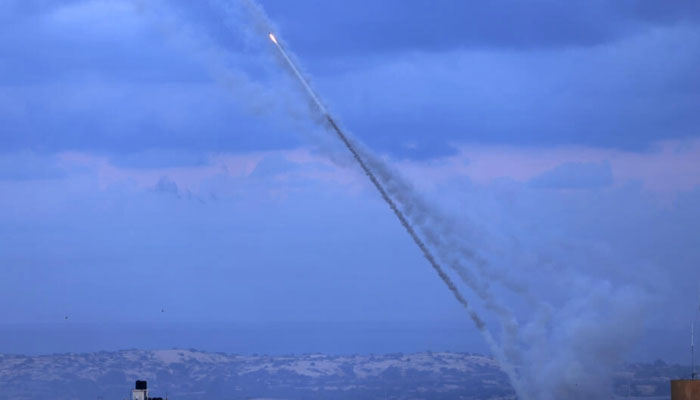Media reporting on Israel-Hamas war faces singular challenges
PARIS: Global media outlets are facing near-unprecedented challenges in their coverage of the Israel-Hamas war as conflicting propaganda, social media pressure and charged public opinion require them to exercise extreme caution.
Lack of foreign media access to Gaza, with both the Israeli and Egyptian access points closed, is adding to reporting difficulties the likes of which journalists say they have rarely seen before.
“This war is one of the most complex and polarising stories we have ever had to cover,” Deborah Turness, chief executive of BBC News, said in an online post this week. Palestinian reporters in Gaza provide global media outlets with images and information, but their work is hampered by the bombing of the territory, power cuts and petrol shortages.
Their union says 22 journalists have been killed in Gaza since October 7, the day militants belonging to the Islamist Hamas movement attacked Israel. “In previous conflicts we were always able to send special envoys, but this time our teams in Gaza are cut off from the rest of the world,” said Phil Chetwynd, Global News Director at AFP.
AFP, whose permanent bureau in Gaza employs around 10 journalists, has had to move them out of Gaza City to the south of the territory where they are living in precarious conditions, with some sleeping in tents.
A total of 2,050 journalists have come to Israel to cover the war, according to the government. The biggest contingent, 358, is from US media. British media are second with 281, followed by French outlets with 221.
Media in Ukraine, which is itself fighting a war at home, have sent two journalists to Israel. Reporters Without Borders (RSF), a nonprofit organisation defending press freedom, has accused Israel of “suffocating journalism in Gaza”.
For the International Federation of Journalists (IFJ), this has forced reporters to rely heavily on “official” sources, without being able to verify their claims. “Confusing haste with speed, many media have published false information and images that have not been contextualised, verified or presented as reliable,” the IFJ said. One notable example was the claim that Hamas militants had beheaded babies, which got widely picked up in media, including in a live report on CNN, without having been confirmed.
“I needed to be more careful with my words and I am sorry,” CNN anchor Sara Sidner later posted on X after reporting the claim live on air. Another example is the high-profile case of the Ahli Arab hospital in Gaza.
On October 17, several media, including AFP, reported on a statement by the Hamas health ministry that 200 to 300 people had been killed in a strike on the hospital, for which it blamed Israel. Israel later denied the claim, saying a “misfired rocket” by the Palestinian Islamic Jihad had caused the damage.
-
 All You Need To Know Guide To Rosacea
All You Need To Know Guide To Rosacea -
 Princess Diana's Brother 'handed Over' Althorp House To Marion And Her Family
Princess Diana's Brother 'handed Over' Althorp House To Marion And Her Family -
 Trump Mobile T1 Phone Resurfaces With New Specs, Higher Price
Trump Mobile T1 Phone Resurfaces With New Specs, Higher Price -
 Factory Explosion In North China Leaves Eight Dead
Factory Explosion In North China Leaves Eight Dead -
 Blac Chyna Opens Up About Her Kids: ‘Disturb Their Inner Child'
Blac Chyna Opens Up About Her Kids: ‘Disturb Their Inner Child' -
 Winter Olympics 2026: Milan Protestors Rally Against The Games As Environmentally, Economically ‘unsustainable’
Winter Olympics 2026: Milan Protestors Rally Against The Games As Environmentally, Economically ‘unsustainable’ -
 How Long Is The Super Bowl? Average Game Time And Halftime Show Explained
How Long Is The Super Bowl? Average Game Time And Halftime Show Explained -
 Natasha Bure Makes Stunning Confession About Her Marriage To Bradley Steven Perry
Natasha Bure Makes Stunning Confession About Her Marriage To Bradley Steven Perry -
 ChatGPT Caricature Prompts Are Going Viral. Here’s List You Must Try
ChatGPT Caricature Prompts Are Going Viral. Here’s List You Must Try -
 James Pearce Jr. Arrested In Florida After Alleged Domestic Dispute, Falcons Respond
James Pearce Jr. Arrested In Florida After Alleged Domestic Dispute, Falcons Respond -
 Cavaliers Vs Kings: James Harden Shines Late In Cleveland Debut Win
Cavaliers Vs Kings: James Harden Shines Late In Cleveland Debut Win -
 2026 Winter Olympics Snowboarding: Su Yiming Wins Bronze And Completes Medal Set
2026 Winter Olympics Snowboarding: Su Yiming Wins Bronze And Completes Medal Set -
 Trump Hosts Honduran President Nasry Asfura At Mar-a-Lago To Discuss Trade, Security
Trump Hosts Honduran President Nasry Asfura At Mar-a-Lago To Discuss Trade, Security -
 Cuba-Canada Travel Advisory Raises Concerns As Visitor Numbers Decline
Cuba-Canada Travel Advisory Raises Concerns As Visitor Numbers Decline -
 Anthropic Buys 'Super Bowl' Ads To Slam OpenAI’s ChatGPT Ad Strategy
Anthropic Buys 'Super Bowl' Ads To Slam OpenAI’s ChatGPT Ad Strategy -
 Prevent Cancer With These Simple Lifestyle Changes
Prevent Cancer With These Simple Lifestyle Changes




